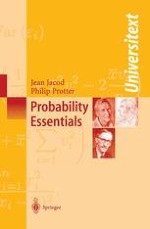2004 | OriginalPaper | Buchkapitel
Weak Convergence
verfasst von : Jean Jacod, Philip Protter
Erschienen in: Probability Essentials
Verlag: Springer Berlin Heidelberg
Enthalten in: Professional Book Archive
Aktivieren Sie unsere intelligente Suche, um passende Fachinhalte oder Patente zu finden.
Wählen Sie Textabschnitte aus um mit Künstlicher Intelligenz passenden Patente zu finden. powered by
Markieren Sie Textabschnitte, um KI-gestützt weitere passende Inhalte zu finden. powered by
In Chapter 17 we considered four types of convergence of random variables: pointwise everywhere, pointwise almost surely, convergence in pth mean (Lp convergence), and convergence in probability. While all but the first differ from types of convergence seen in elementary Calculus courses, they are nevertheless squarely in the analysis tradition, and they can be thought of as variants of standard pointwise convergence. While these types of convergence are natural and useful in probability, there is yet another notion of convergence which is profoundly different from the four we have already seen. This convergence, known as weak convergence, is fundamental to the study of Probability and Statistics. As its name implies, it is a weak type of convergence. The weaker the requirements for convergence, the easier it is for a sequence of random variables to have a limit. What is unusual about weak convergence, however, is that the actual values of the random variables themselves are not important! It is simply the probabilities that they will assume those values that matter. That is, it is the probability distributions of the random variables that will be converging, and not the values of the random variables themselves. It is this difference that makes weak convergence a convergence of a different type than pointwise and its variants.
